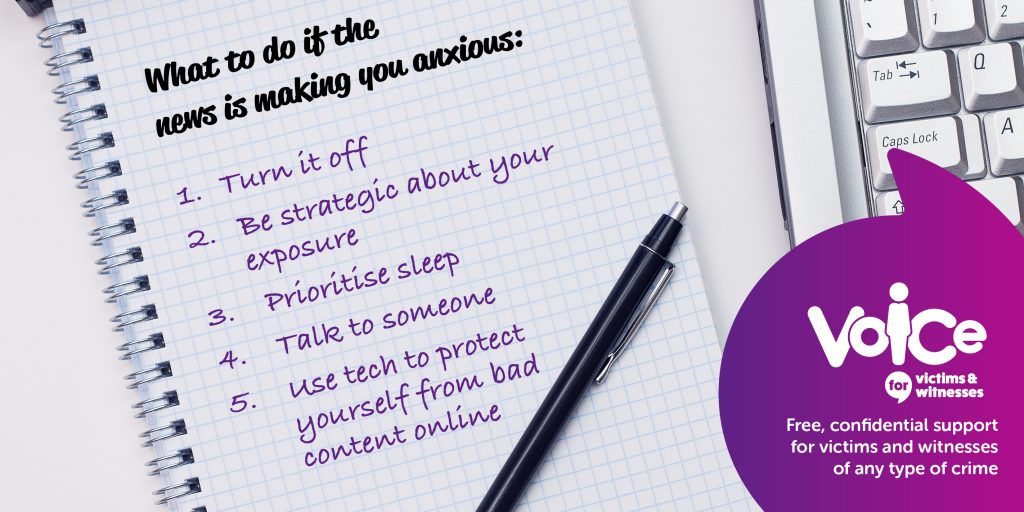What to do if the news is making you feel anxious

Rolling news channels are both a blessing and a curse.
If you need to take ten minutes out to catch up with what’s going on in the world, they provide an immediate fix. But when times are tough, the seemingly endless repetition of the same harrowing stories – each time featuring new ‘found footage’ and disturbing imagery – can take it’s toll on even the strongest of minds.
If you’ve been affected by crime, rolling news can be particularly challenging when situations that spark memories of your own experiences are broadcast incessantly.
With that in mind, we’re going to look at five simple things you can do when the news starts to become too much.
1. Turn it off
Reach for that remote; turn the TV off; throw the paper into the recycling bin.
We understand this is often easier said than done (thanks to the ability for bad news to get under your skin and reel you in) but remember – you’re in control.
Keeping up with current affairs and world events is important, but nothing is more important than your happiness. If something is making you feel unhappy or reviving bad memories – turn it off.
2. Be strategic about your exposure to news
We’re surrounded by news these days. Aside from the TV and newsstand, our smartphones ‘helpfully’ ping us notifications of the latest headlines every ten minutes and an increasing number of websites feature countless links to news stories that are eminently clickable.
However, if you set some structure around when and where you digest news, you’ll find it far easier to disconnect.
For you, it might be checking the recent headlines first thing in the morning (try and avoid doing so before you go to bed – see point 3) or taking fifteen minutes out of your lunch break to scour your phone’s newsfeed. Whatever and whenever it is, build a routine around news – don’t let it own you.
3. Prioritise sleep
As noted above, watching or reading the latest headlines before you go to bed is risky, because it’ll decrease your chances of getting a good night’s sleep.
The benefit of no longer having to wait until the 9 o’clock news to get our daily fix is that we can catch up whenever we need to. And that means sleep can become a priority.
4. Use tech to protect yourself from bad content online
‘Fake news’, as it has become known, is a menace. Not only are the stories that often appear within our news feeds entirely untrue – some are downright frightening.
Thankfully, most social media platforms give you the ability to block and report news that offends, so hunt down such settings and turn them on in order to create a system that serves its purpose for you.
If you have friends on social media that regularly share content you find disturbing, block or hide them. Most platforms won’t inform the person that you’ve done so and with one click of a button, you’ll have eradicated such news from your digital world.
Earlier this year, the BBC posted a fascinating article on how fake news could be prevented from spreading; if you’ve been adversely affected by this type of content, it’s well worth a read.
5. Talk to a friend, or talk to Voice
If you’re feeling anxious about the news, talk to someone you trust.
Anxiety is often heightened when we feel alone, and by simply reaching out and talking to someone, you’ll immediately feel better.
Tell them what it is you’ve seen that’s bothered you, and ask if they’ve experienced something similar – chances are they most certainly will have.
If you’ve been reminded of crime by something you’ve seen on the news, and need to talk it out, Voice is here. It doesn’t matter when or where the original incident happened, or if it was reported to the police or not. Whatever has happened, we’re here to help.
Final thought
The takeaway today is a simple one: you’re in control. You decide how much news you digest and when you do so – no one else.
We’re living in challenging times, but the news has a habit of amplifying the bad stuff if you stay hooked to it for too long. Instead, prioritise the great things in your life.
